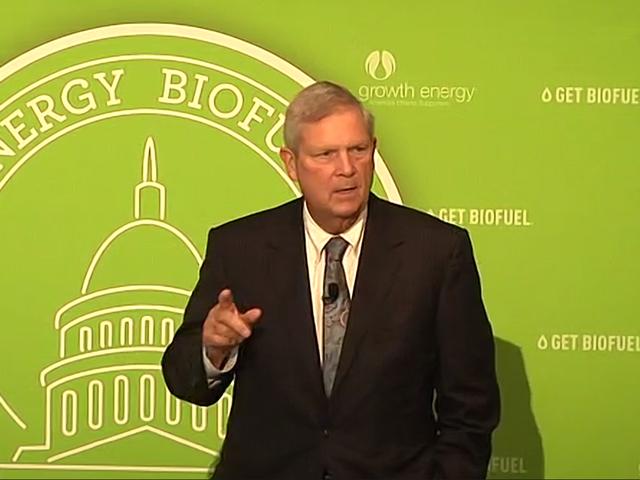Vilsack: Ethanol's SAF Opportunity Big
Ag Secretary: Ethanol Industry Needs to Address CO2 To Be SAF Attractive
LINCOLN, Neb. (DTN) -- U.S. Secretary of Agriculture Tom Vilsack didn't pull any punches on Tuesday when talking about rural America's and ethanol's future in sustainable aviation fuel production.
Vilsack said during a keynote address at the Growth Energy summit in Washington, D.C., that although there are hundreds of bio products that can be produced using agriculture waste including livestock manure, the future growth of SAF has created a new life for the ethanol industry.
Yet the question keeps coming up: Is ethanol's carbon footprint small enough to be the go-to feedstock for SAF?
Vilsack emphasized the need for the ethanol industry to continue to work to bring down its carbon score to be more attractive to airline companies expanding their SAF use.
"But you have to understand something else, which is that you have to be able to make the case that your product is in fact a low-carbon fuel and you want to do something with the CO2," he said.
"I'm not gonna tell you what you need to do about it, but you need to do something about it. And farmers need to understand the significance of this. Farmers come up to me and they say, 'Oh, we got to stop talking on electric vehicles.' No, because we want to make sure we continue to have manufacturing in this country because it employs a lot of people. We're gonna have cars that use ethanol for a long time."
One such avenue for ethanol plants is building carbon pipelines. So far, however, carbon pipeline projects have struggled to gain broad approval from state regulatory authorities, https://www.dtnpf.com/….
Vilsack shared a set of numbers that caught the attention of the ethanol-industry audience. That is, 16,700 farms have gone out of business and 6.9 million acres of farmland have come out of production since 2017, he said.
About 150,000 farms sell more than $500,000 in annual profit, Vilsack said, representing about 89% of farm income in the U.S. More than 92% of all farms, he said, share the other 11% of income.
P[L1] D[0x0] M[300x250] OOP[F] ADUNIT[] T[]
"OK with that?" Vilsack said.
"So, the good news is that we actually have, for the first time, a very comprehensive effort to begin helping small, midsize farming operations stay in business. And the way we are doing this is by creating new revenue streams that either didn't exist before or improving revenue streams that do exist."
It can be reversed, Vilsack said, by expanding markets for new biobased products including sustainable aviation fuel.
The ethanol industry has been calling on the EPA and other federal agencies to adopt the Greenhouse Gases, Regulated Emissions, and Energy Use in Transportation, or GREET, model to provide a fair accounting of the carbon footprints of biofuels including SAF.
Biofuels groups in general support the use of GREET because it includes all the latest assumptions about the carbon performances of those fuels.
Vilsack said USDA is doing what it can to make sure the model is ready for use by the U.S. Treasury Department to draft regulations for SAF tax credits.
"So, we're working on the modeling to make sure that there's a broad array of feedstocks that can qualify including ethanol," he said.
"We're spending our resources at USDA to make sure the GREET model is where it needs to be. We're working collaboratively with all the agencies that have to be worked on to make sure that we have a unified approach on this."
AIRLINES WANT FEEDSTOCKS
Vilsack said the airline industry has made it clear that it wants to use SAF produced with a wide variety of feedstocks to make it sustainable for the long term.
Helping agriculture to be front and center in that effort, Vilsack said, is critical for rural America.
"The airlines want lots of different feedstocks I want you to have because it's critical to keeping small and midsize folks in business," Vilsack said.
"And that's critical to keep the small towns. If there are fewer farm families, that means there are fewer kids in the schools, and you know what happens when that happens? Schools consolidate and kids get bused. When you have fewer kids with fewer families, you get fewer customers for a small-town business. So, that main-street business gets boarded up instead of opened up."
Vilsack said that not only is SAF production and the bio-based economy in general an opportunity for rural America but also for the rest of the world.
"We're seeing the beginning of the rest of the world understanding the export opportunities here, and every once in a while, we export a little of the product," he said.
"I think there's a much larger market opportunity. But first and foremost, we have to get it right here."
Todd Neeley can be reached at todd.neeley@dtn.com
Follow him on X, formerly known as Twitter, @DTNeeley
(c) Copyright 2023 DTN, LLC. All rights reserved.




